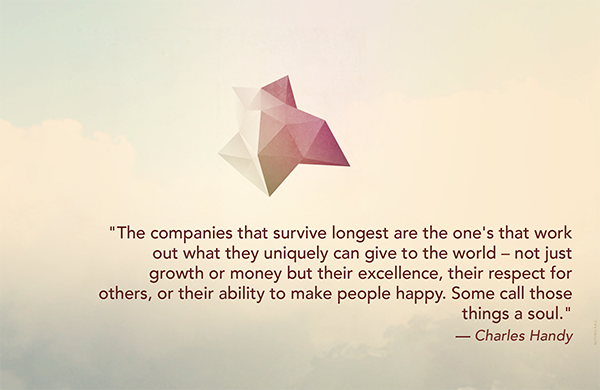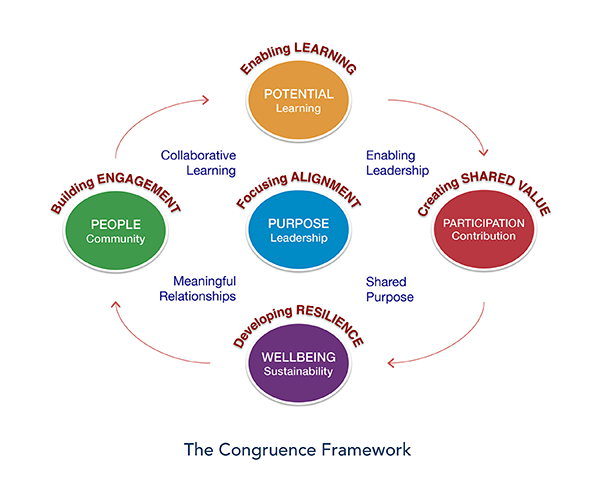Purpose + Community + Learning + Contribution + Wellbeing
Five essential focal-anchors of a sustainable organisation…. and
Shared purpose + enabling leadership + meaningful relationships + collaborative learning
Four critical elements of a sustainable organisational culture
How does your organisation measure up?
- Does your organisation have a beyond-profit purpose (raison d’etre) that is embraced by all of its stakeholders?
- Does your organisation foster an inclusive and collaborative culture of community?
- Does your organisation value difference, diversity and change as opportunities for learning?
- Does your organisation generate outcomes that represent shared-equitable value for all of its stakeholders?
- Does your organisation really care about the cultural, socioeconomic and environmental wellbeing of its stakeholder community?
I was recently asked to deliver a short keynote address to the annual conference of an international organisation. I decided to frame my talk as a challenge to the sustainability of their organisation in the 21st century – a way of focussing audience attention on key strategic issues and their real opportunities for positive change. After discussing my approach with the conference organisers it became obvious that my challenge questions would be too confronting for the global audience and ‘unhelpful’ for global management whom (I realised later) did not have the capacity (or perhaps the will) to continue my conversation into the future.
Thus, my attempt to host a conversation with a diverse and influential group of global business people about the future of their organisation was not to be. I wonder if your organisation would also be challenged by the following five ‘focal-anchor statements’ that were to frame my talk?
1| 21st century organisations will know who they are and why they exist:
- They will be clear about their purpose and their ambition for the future
- Their purpose will be beyond profit and embraced by their stakeholder community
- And their ambition will be the manifestation of that purpose in the medium term
- They will enjoy enabling leadership, which is about selfless service to others
- And a shared responsibility for success
21st century organisations will be ‘purposeful and enabling communities’
“Core purpose is the organisation’s reason for being…it captures the soul of the organisation” – Jim Collins and Jerry Porras, Built to Last
2| 21st century organisations will care deeply about their people:
- Their people will include all those who share their purpose and ambition for the future
- They will enjoy an inclusive culture of collaborative community
- Enabled by meaningful relationships that secure adaptive and resilient stakeholder networks
- And sustain their capacity to successfully navigate disruptive change
21st century organisations will be ‘collaborative, adaptive and resilient communities’
“To create better health in a living system, connect it to more of itself” – Margaret Wheatley
3| 21st century organisations will be learning organisations:
- They will embrace dissent, difference and diversity as opportunities for learning
- They will engage the real potential of their stakeholder community through collaborative learning
- They will innovate together and learn with and from each other
- And co-create their future together
21st century organisations will be ‘learning communities’
“Can we create soulful workplaces – schools, hospitals, businesses, and nonprofits – where our talents can blossom and our callings can be honored?” ― Frederic Laloux, Reinventing Organizations
4| 21st century organisations will create equitable-shared value for all of their stakeholders:
- They will participate with their stakeholder community to co-create mutual value outcomes
- They will have a win-win attitude, a collaborative mindset and a contribution focus
- And generate outcomes that benefit their community and the society that hosts their presence.
21st century organisations will be ‘mutual-benefit communities’
“We are finally waking to the fact corporations are not the center of our economic universe, with people and Nature orbiting around them. In fact the opposite is true.” – Joseph Bragdon, Profit for Life
5| 21st century organisations will be sustainable:
- They will be agile, resilient, fit for purpose and responsible ‘corporate citizens’
- And their wellbeing will be sustained by the equitable-shared value they add to their stakeholder community
- Value that reflects their keen attention to the cultural, socio-economic and environmental needs of that community
21st century organisations will be ‘sustainable communities’
“We have an imperative to shift from creating shareholder value to stakeholder value… corporate management isn’t just accountable to shareholders… businesses must focus on serving the interests all stakeholders — customers, employees, partners, suppliers, citizens, governments, the environment and any other entity impacted by its operations.” – Mark Benioff – Chairman/CEO, Salesforce
21st century organisations will be ‘congruent communities’
-
Their presence in our society will be framed by their purpose and ambition for the future, which will inspire and engage their stakeholder community
-
They will enjoy enabling leadership, which is about helping others to succeed
-
They will operate as a vibrant and collaborative community of purpose sustained by resilient and adaptive community networks that are enabled and secured by meaningful (mutual-value) relationships
-
They will recognise and release the potential within their community by fostering collaborative learning as a way of embracing their diversity, welcoming difference and dissent and navigating disruptive change
-
Their special contribution to our society will be clearly evident in the shared-equitable value they co-create with their community, and
-
Their future will be assured by a demonstrable commitment to improving the wellbeing of their people and enhancing and safeguarding the environment that sustains their presence.
To read more about congruent organisations, communities and individuals please refer to The Congruence Framework



Leave A Comment